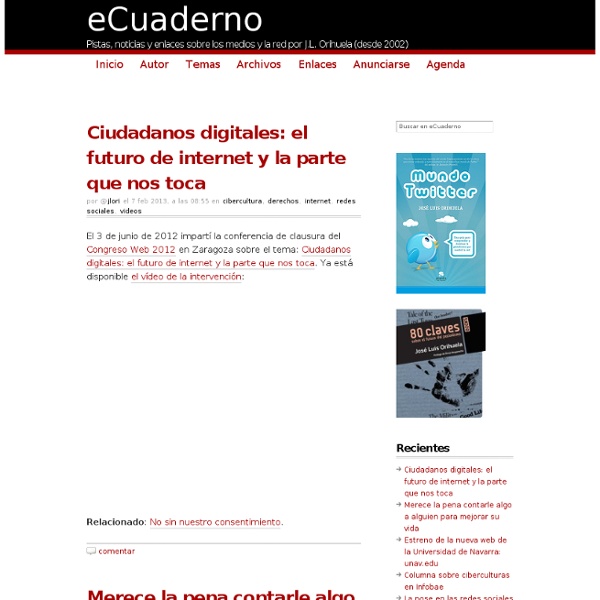



Making Learning Fun! This month’s LCBQ is “How do you make e-learning fun?” I begin with a quote by British novelist, Arnold Bennett who said, "There can be no knowledge without emotion. We may be aware of a truth, yet until we have felt its force, it is not ours. To the cognition of the brain must be added the experience of the soul." I believe this quote sums up all the reasons why we should include emotions – not just fun - into our learning interventions – e-learning or any learning for that matter.
`The truth will always win’ - Julian Assange writes - Media Diary Blog Wikileaks founder Julian Assange wrote this Op-Ed for The Australian today: Key lines: * WikiLeaks is fearlessly publishing facts that need to be made public. * The dark days of corruption in the Queensland government before the Fitzgerald inquiry are testimony to what happens when the politicians gag the media from reporting the truth. * (My idea is) to use internet technologies in new ways to report the truth. Five Reasons for Integrating Technology We speak about the achievement gap between the different cultures in our schools. Meanwhile, however, many of the stakeholders in education have created a vast trench that lies between those who accept the inevitability of technology and those who still refute its place in our classrooms. Policymakers demand our schools must reflect the 21st century, yet continue to deny schools the funding to do just that. Additionally, our districts block many of the online sites for collaboration from our schools. It is fear that guides many of the decisions about educational technology: fear that we will be left globally behind by countries more committed to technology integration and also fear that our students will somehow be scarred its use.
Breaking through information monopoly - Features TUNIS, Tunisia - As history has shown repeatedly, access to information can play a decisive role in triggering social change. The publication of leaked diplomatic cables by the whistle-blowing organisation WikiLeaks has been controversial. But as a panel at the Third Arab Bloggers' Meeting affirmed this week, the monopoly of state media in most authoritian Arab regimes had been progressively undermined for several years as citizens sought alternative information from dissident bloggers and television. WikiLeaks, if anything, offered the final blow, and, in fact, found partners in the Arab world in the alternative media. In North America and Europe, WikiLeaks formed partnerships with major news organisations.
Your Professor, Your Computer, and You Can students possibly learn more sitting alone, staring at a computer screen for hours on end than they could sitting amongst peers and interacting directly with an expert well versed in the subject at hand? Surprisingly, several studies, including one by the U.S. Department of Education, suggest that students are able to retain more and perform slightly better in an online setting than in a traditional one.
WikiLeaks Archive — Cables Uncloak U.S. Diplomacy Some of the cables, made available to The New York Times and several other news organizations, were written as recently as late February, revealing the Obama administration’s exchanges over crises and conflicts. The material was originally obtained by , an organization devoted to revealing secret documents. WikiLeaks posted 220 cables, some redacted to protect diplomatic sources, in the first installment of the archive on its Web site on Sunday. Cablegate One Year Later: How WikiLeaks Has Influenced Foreign Policy, Journalism, and the First Amendment One year ago today, WikiLeaks started publishing a trove of over 250,000 leaked U.S. State Department cables, which have since formed the basis of reporting for newspapers around the globe. The publication has given the public a window into the inner workings of government at an unprecedented scale, and in the process, has transformed journalism in the digital age.
Localeaks: A Drop-Box for Anonymous Tips to 1400 U.S. Newspapers Although the mission of WikiLeaks is to "open governments," it's done quite a lot to make us think about how to open journalism as well. We've seen a number of new whistleblower sites crop up - OpenLeaks and Rospil, for example - as well as major news organizations - Al Jazeera, and perhaps even The New York Times - investigate ways to facilitate more whistle-blowing and leaking. But why wait for local newspapers to roll out their own anonymous tips pipeline when a project from CUNY Graduate School's Entrepreneurial Journalism program has designed just that thing.